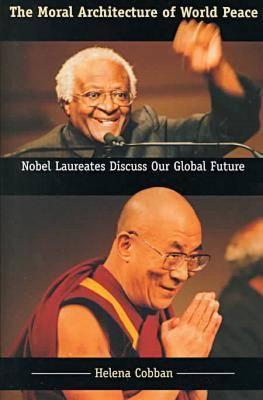

 University of Virginia Press
University of Virginia Press
The Moral Architecture of World Peace: Nobel Laureates Discuss Our Global Future


Key Metrics
- Helena Cobban
- University of Virginia Press
- Hardcover
- 9780813919874
- 9.48 X 6.33 X 0.97 inches
- 1.46 pounds
- Political Science > International Relations - General
- English
 Secure Transaction
Secure TransactionBook Description
In November 1998, eight visionary recipients of the Nobel Peace Prize gathered on the grounds of the University of Virginia for two days of extraordinary dialogue. From the words of His Holiness the Dalai Lama to Archbishop Desmond Tutu's riveting description of chairing South Africa's Truth and Reconciliation Commission, their conversation ranged from familiar international-relations issues to areas traditionally excluded from such discourse, like the need for personal transformation and community organizing.
From the laureates' speeches and exchanges, the veteran journalist Helena Cobban has drawn a powerful, prescient vision of our shared global future. Unlike other recent books on global change, The Moral Architecture of World Peace is based on the heroic stories of nine individuals, from as varied backgrounds as Rigoberta Mench� Tum and Jody Williams, who base their view of world peace on personal strength and public activism, not economic trends.
Each chapter contains one laureate's version of a shared message: that peace is grounded in the personal and spiritual as well as the economic and military dimensions of global interconnectedness. When the Dalai Lama speaks of the need for inner as well as external disarmament, he is asking for a greater commitment than the most complicated nuclear arms treaty. Along similar lines, the Northern Ireland peace activist Betty Williams tells of her hope to disarm the landmines of the heart, the bitterness that lives on in war survivors that can be more destructive than physical scars. Jody Williams and Bobby Muller, 1997 laureates, sound a concordant note in the story of their successful campaign to win an international treaty banning landmines.
Former Costa Rican president Oscar Arias S�nchez, architect of the five-nation peace accord in Central America, challenges citizens of rich western countries to recognize the gap between their luxury spending and the amounts needed to fund basic human services in other parts of the world. Indigenous-rights activist Rigoberta Mench� Tum and East Timorese representative Jos� Ramos-Horta both lament the human and social costs paid by what Ramos-Horta calls, sorrowfully, the world's expendable peoples. Harn Yawnghwe, speaking on behalf of the Burmese democratic leader Aung San Suu Kyi, who was refused the right to travel by her government, talks of the tough issues of preparing for a transition to postauthoritarian rule in a country that has been run by a military junta.
As Helena Cobban articulates, these leaders all seem to subscribe to a broader set of truths that are not necessarily self-evident: that human beings can easily become locked into self-perpetuating systems of suspicion and violence at any level, from the interpersonal through the international; that when one is inside such a system, it can be hard to see it and to recognize one's own role within it; but that each one of us has the capacity to make a leap from self-centeredness toward greater understanding. Try to change motivation, the Dalai Lama urges.
But while these laureates' stories are primarily of personal and political triumph, they also tell of great sacrifice, conflict, and pain. Bobby Muller's passionate exchange with Archbishop Tutu on moral accountability versus reconciliation, and the self-examination of Ramos-Horta, who reflected that his own East Timorese independence movement may have hurt the chances of United States' intervention to prevent Indonesia's brutal invasion of his country, point toward the new kinds of challenges we face in the next century.
From the candor, eloquence, humor, and differences expressed by these inspiring people, Helena Cobban has sketched out a new international paradigm of peace.
Videos
No Videos
Community reviews
Write a ReviewNo Community reviews